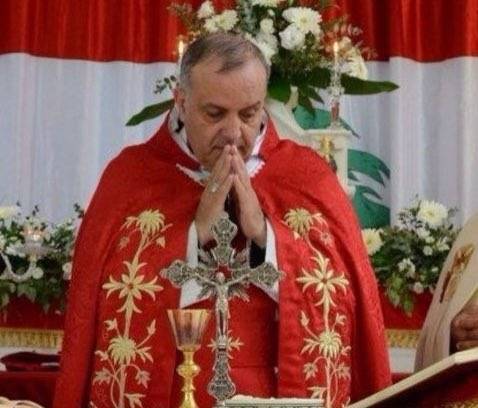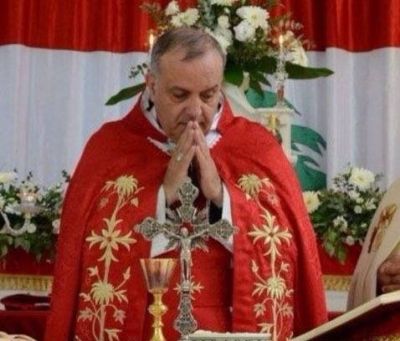
Archbishop Moussa al-Hage. (Photo taken from Twitter)
The facts
On Monday, at 11:30 a.m., the Maronite Archbishop of Haifa and Jerusalem, who resides at the headquarters of the bishopric of Jerusalem, arrived in Ras Naqoura. He was arrested by General Security on the orders of military court Judge Fadi Akiki, before being interrogated for twelve hours. He was released around midnight, after having been stripped of his passport and cell phone, as well as a sum of $460,000 and medicines sent by Lebanese who claimed asylum in Israel after withdrawal of the Israeli army in 2000 to their relatives living in Lebanon. According to an ecclesiastical source interviewed by L'Orient-Le Jour, Akiki did not want to release Hage, but strong pressure from high judicial authorities finally led to his release. A statement issued Thursday by General Security said that the archbishop was "well treated" and that the measures it took were legal, especially since they were executed "on the instructions of the judiciary, in relation to the instructions concerning all passengers who travel between the two countries, without exceptions.”
On the side of Bkerki, church officials considered that the incident creates a serious precedent.
"Neither principles, nor laws, nor customs allow such an arrest," said a source from Bkerki, asserting that an archbishop cannot be arrested without referring to his hierarchical authority.
What are the acts of which Archbishop Hage is accused?
The alleged acts are the transfer of funds from an enemy state and the import of Israeli medicines, the prescriptions of which are written in Hebrew and the packaging of which also contains inscriptions in that language.
MP Qassem Hashem (Baath Party/Marjayoun-Hasbaya), a member of the Amal parliamentary bloc, criticized such actions, saying they "violate the laws on boycotting Israel.”
"Whatever aid is given, it must not come from an enemy state," he said, stressing that "those who violate these laws are liable to prosecution.
According to the pro-Hezbollah newspaper al-Akhbar, the archbishop had, some time ago, received money from a Lebanese who had fled to the occupied territories, which he handed over to a soldier in the Lebanese army who was allegedly recruited by Mossad and then tried by the military court.
According to al-Akhbar, the prelate has been bringing large sums of money into Lebanon for nearly 18 months at the rate of one "suitcase" per month or every 45 days. The security services have reportedly warned him that the money he carries is provided by Lebanese who have been convicted of collaboration with Israel and is likely to be confiscated because it comes from a state described as hostile, the newspaper said.
What does the archbishop say?
The Archbishop rejects all these accusations. In an interview with L’Orient-Le Jour, he explains of the sums transported, "I have been delivering aid to families for months, and it is never to the same people. I have been providing this service for 10 years. Since the explosion of the port on Aug. 4, 2020 and the economic collapse, the amounts have increased because the need has become greater.”
“Every person in the occupied territories who wanted to send money to his family in Lebanon came to the parish to give me the envelope. Those who arrested me claim that this money is for the families of the Israeli agents and are trying to punish me. They are not [Israeli] agents, but the Lebanese who fled to Israel [after the withdrawal of Israel in 2000, editor's note],” he said.
Contacted by L’Orient-Le Jour, the former minister Sejaan Azzi, also close to the Maronite patriarch, assures that the Hage’s activities are "regular, social, humanitarian and religious.”
"It has been carried out since the 19th century," he said, noting that after the creation of the state of Israel, "the Maronite patriarchate has continued to this day to be represented by bishops.
What does the Lebanese law say?
Lebanese law prohibits any kind of economic relationship with Israeli citizens. According to article 285 of the penal code, any Lebanese citizen who attempts to make a social, buying, selling or bartering transaction with a citizen of the enemy state is liable to a prison sentence of at least one year. Some religious people are granted an exception to move freely between Israel and Lebanon. However, anything that involves the conveyance of funds that do not belong to the Church is prohibited.
What are the legal consequences?
Akiki had summoned Hage for a hearing to be held on Wednesday, but he did not appear. A source close to Bkerki said that only the Pope can judge bishops. On this point, a military court judge, Fadi Sawan, had declared in a decision dated May 22 that he was not competent to rule on criminal matters imputed to bishops.
"Only the Roman Pontiff has the right to judge patriarchs and bishops," said the ruling, an excerpt of which was obtained by L’Orient-Le Jour. Bkerki is now asking for the dismissal of Judge Fadi Akiki. This is "beyond my jurisdiction as minister," the caretaker Minister of Justice Henri Khoury said yesterday in Diman, the summer seat of the Maronite Patriarchate. For his part, the Public Prosecutor of the Court of Cassation, Ghassan Oueidat, said that "there is no political backdrop" behind this case, in the columns of the daily al-Sharq al-Awsat.
"Do not attack the justice system that enforces the laws you have adopted. If you do not want to apply the law, amend it," he said in reference to the law on boycotting Israel and Israeli products.
What political context?
In the interview he gave to L’Orient-Le Jour, Hage asserted that "the objective [of my arrest] is clearly to send a strong message to the patriarch.” There is a double political context at play. On the one hand, relations between Bkerki and Hezbollah have greatly deteriorated in recent months. Patriarch Bechara al-Rai has increased his criticism of Hezbollah and called for the affirmation of Lebanon's neutrality, which has the result of annoying the political party and militia involved in several regional conflicts. The patriarch's speeches in support of Judge Tarek Bitar, who is in charge of the investigation into the explosion in the port of Beirut, are also not to the liking of Hezbollah, which accuses the magistrate of being "politicized."
On the other hand, the Secretary General of Hezbollah, Hassan Nasrallah, has recently been talking about the risks of an imminent war with Israel. In this context, it is likely that the party seeks to put a check on any person or action that might have a direct or indirect link with Israel.
This article was originally published in French in L'Orient-Le Jour.
